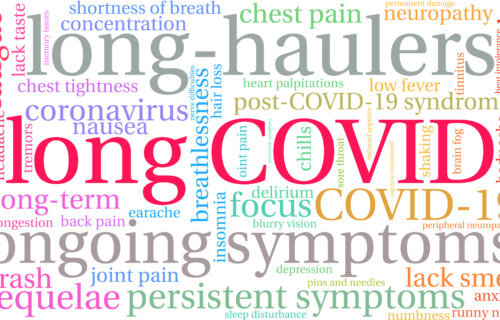LONDON — Even years after infection, long COVID still affects the brains of those dealing with the lingering condition. King’s College London researchers have found that people with long-term COVID-19 symptoms like brain fog displayed reduced performance in tasks that tested different mental processes up to two years after their infection.
The team examined whether long COVID affected performance in over 3,000 participants from the COVID Symptom Study Biobank study using two rounds of online cognitive testing in 2021 and 2022. The study covered 12 tasks that tested memory, attention, reasoning, processing speed, and motor control.
Those with test scores impacted the most by the virus were the same people who experienced related symptoms for 12 weeks or longer. In these participants, the effects of COVID-19 on test accuracy were comparable to the effect of aging 10 years.
Between the two test rounds, which took place nine months apart, there was no significant improvement in scores. By the second time around, it was almost two years since the participants’ initial COVID-19 infection.
Delving deeper, the researchers split the participants by whether they felt fully recovered from the infection or not. Those who felt they recovered performed similarly to those who were never infected. On the other hand, those who didn’t feel they recovered scored lower on average.

“Our findings suggest that, for people who were living with long-term symptoms after having COVID-19, the effects of the coronavirus on mental processes such as the ability to recall words and shapes are still detectable at an average of almost two years since their initial infection,” says lead author Dr. Nathan Cheetham, a Senior Postdoctoral Data Scientist at King’s College London, in a media release.
“However, the result that COVID had no effect on performance in our tests for people who felt fully recovered, even if they’d had symptoms for several months and could be considered as experiencing ‘long COVID’, was good news. This study shows the need to monitor those people whose brain function is most affected by COVID-19, to see how their cognitive symptoms continue to develop and provide support towards recovery.”
“We used sensitive tests to measure speed and accuracy across a range of brain challenges. This study shows that some individuals have measurable changes in these tests after COVID-19 going on for nearly two years. The fact remains that two years on from their first infection, some people don’t feel fully recovered and their lives continue to be impacted by the long-term effects of the coronavirus. We need more work to understand why this is the case and what can be done to help,” adds Professor Claire Steves, a Professor of Aging and Health at King’s College London.
The findings are published in the journal EClinicalMedicine.
You might also be interested in:
- ‘Long COVID’ symptoms debunked: Scientists find only 7 persistent effects from infections, not 200
- Man misdiagnosed with long COVID actually had brain tumor growing for 10 years
- No easy answers: Long COVID is not just one condition, study finds


I’ve had long Covid since 2021 and live a a frustrating life dealing with all the lingering symptoms. Sometimes I feel like doctors are tired of hearing my complaints.
Totally changed my life.